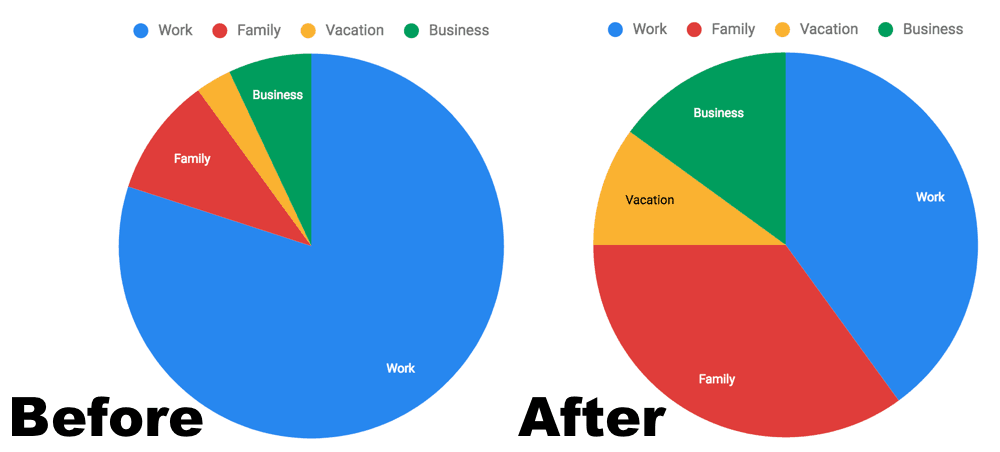
Meet Scott.
How a busy dad got more time for his family—while increasing his income and working less
| Why Scott Came to AE | How Scott Used AE | Scott’s Results |
|---|---|---|
| Scott was overwhelmed by his never-ending task list and lack of time. He had trouble sleeping and being present with his family, and he wanted to build a side business he was passionate about. | Scott devoured our free articles, but then he wanted something more: personalized, one-on-one attention to quickly hit his goals. | Scott never works on Sundays, which are family time now. He takes family vacations, has built a side business, and sleeps better. And he does all this while hitting record numbers at work. |
Scott didn’t want to let his employer and family down
“It felt like I had lost control.”
In 2015, Scott was successful in many ways.
He was one of the top three loan officers in the country at his Fortune 100 company. He had a beautiful wife and kids. He earned a high income, and his family didn’t have to worry about money.
But Scott wasn’t in control of his days. His schedule was set by the demands of other people, and by a never-ending task list. “It had gotten to the point where I knew if I finished this task, it would generate another one. You feel like you’re on this wheel.”
To make matters worse, Scott felt compelled to stay at work until he’d finished all his tasks and cleared all his emails for the day. The end result was spending long days feeling chained to his desk.
“It felt like I had lost control of how I responded, how quickly I responded, and setting expectations.”
Too consumed with work to really be there for his family
At the end of the day, Scott would go home with his mind still on work. Sitting at the dinner table, tucking his kids in at night, lying in bed trying to fall asleep…
The whole time he was still wired, his mind racing. Scott was there but not there, and it bothered him.
“I knew that was wrong—not what I wanted my children to remember when they grow up.”
At the same time, Scott was realizing as he matured in his career that his passions lay outside his day job: he wanted to create a side business that fulfilled him.
Scott was working constantly. Something had to give.
Scott had reached the peak of what he could do alone
When Scott first found Asian Efficiency, he liked that our systems and methods come “from the heart.” They’re not laid out as an arbitrary system—they’re things that have worked for the experts on our team and for our 13,000 clients, and we share those stories.
After consuming a lot of our free information, Scott reached out to work with Thanh Pham (the CEO of AE) one on one. Thanh suggested that Scott do something revolutionary: take a lunch break. Scott didn’t even have to eat. He just had to leave his phone at his desk and go for a walk.
And if he happened to miss one day—no big deal. Scott and Thanh worked together to reframe “failure.” Things happen, and if Scott missed a day, he just course-corrected the next day. This helped Scott avoid beating himself up for “failing” and getting into a guilt spiral. Instead, he just quickly got back on track.
End result: Scott’s been taking breaks every day for a year now. He’s able to set work aside, knowing he’ll get back to it when he’s focused again after a break.
“It’s so simple, but it’s changed how I feel each day and the control I feel like I’m in, to really be able to say ‘my time is valuable,’ and [I’ll do a certain task] when I have undivided attention.”
“Literally, I sleep better. I really do.”
Consistently taking breaks and gaining control of his day has had a ripple effect in Scott’s life.
Because Scott’s energy is restored, he knows what he’s capable of and can set clear expectations at work. He can confidently handle bumpy situations—balancing his boundaries while reliably meeting his obligations to coworkers and clients.
And because Scott knows he’s giving it his best during the day, he sleeps better. He doesn’t wake up an hour after falling asleep, his mind racing with work tasks.
That newfound peace extends into the weekend as well, when Scott walls off time to be with his family. “I do not work on Sundays. I turn it all off. The end result is that I do better the other 50 hours a week.”
Scott does so much better, in fact, that he:
- Hit record numbers at his company recently
- Took a three-week vacation to Hawaii with his family
- Turned his passion into a side business (Thanh and Scott did some business coaching as well)
- Successfully exited a company that he helped triple in sales

Scott’s day and how he spends his time completely changed
Coaching gets you off the “task list hamster wheel”—and on a path forward
“You get in the rat race, where you do feel like your tasks are still generating more tasks, and you can never get out of it. What’s beyond that? Having the coaching is what really helped me quantify that and envision it.”
Why Scott thinks coaching is worth 10 times what you pay for it.
Who does Scott recommend Asian Efficiency to?
In the corporate world, companies don’t often focus on making each individual more effective—that’s on you. And it takes a combination of modern tools (yes, in Windows environments, too!), mindset, and daily habits to boost your productivity. That’s where personalized help from experts can help.
And when you’re building a business, Scott says, “There could be nothing better [than coaching with Asian Efficiency], because there’s so much that you don’t know when you’re trying to step into something else. Having a great idea is worthless if you can’t execute on it. And those systems, processes, and first steps [are things] you need somebody to help you with.”
In sum, Scott says Asian Efficiency can help two types of people:
- People in a corporate job who like it and want to become better at it.
- People who want to build a business.
Now it’s your move
Being a top performer wasn’t enough for Scott—he also wanted time with his family and to pursue his passions through a side business.
What would you like to achieve?
If you are interested in the Asian Efficiency executive coaching program, you can fill out this application.
See Scott’s Whole Story Here
